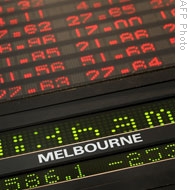VOA标准英语10月-Global Market Volatility Continues(在线收听)
 |
| The Australian Securities Exchange board is a sea of red as Australian shares fell 3.4 percent in morning trade, 30 Sep 2008 |
Stock markets in Japan and Australia posted steep losses of more than four percent, while Hong Kong had a modest gain of less than one percent. Among major European markets, only London was higher in midday trading, while U.S. markets posted early gains after suffering the biggest ever single-day point loss Monday.
Investors in many countries are increasingly panicked, according to senior manager Martin Hannecke of the Hong Kong-based financial firm Tyche Group.
"There is a huge amount of uncertainty now," he said. "The investors here have been looking to go into cash [sell assets] and they have seen substantial losses."
Less than an hour before trading began on Wall Street, President Bush reaffirmed the need for congressional action to stave off further financial upheaval. Mr. Bush spoke hours after European leaders pleaded with their American counterparts to avoid further delay in tackling the situation.
German Chancellor Angela Merkel said that she and the German government expect that a U.S. financial rescue package will be approved this week, which she described as a vital precondition for creating new confidence in the markets.
Meanwhile, a European Union Commission spokesman said the United States must take responsibility and show leadership for its own sake and the sake of the world.
Just as the Bush administration has felt compelled to rescue or take over troubled American financial institutions, two Belgian banks have now received emergency bailouts. Ireland has moved to guarantee bank deposits. Central banks around the world have aggressively injected money into financial systems to counteract tight credit that could strangle economic expansion.
The increasingly-global financial crisis began with a rash of U.S. home foreclosures after a prolonged period of loose credit that saw millions of Americans acquire home mortgages they could not afford. U.S. housing prices have plummeted during the past year, and new figures show further sharp declines in America's biggest housing markets.
Without swift intervention, the situation will get more grim, according to University of Maryland Business and Management Professor Peter Morici.
"We are going to see [U.S.] unemployment in the double digits if we do not do something fast," he said. "And we are going to see housing prices stay depressed, banks failing, the FDIC [Federal Deposit Insurance Corporation] insurance fund running out of money and the Congress having to bail that out."
U.S. congressional leaders have pledged to renew efforts to pass an economic rescue package later in the week.